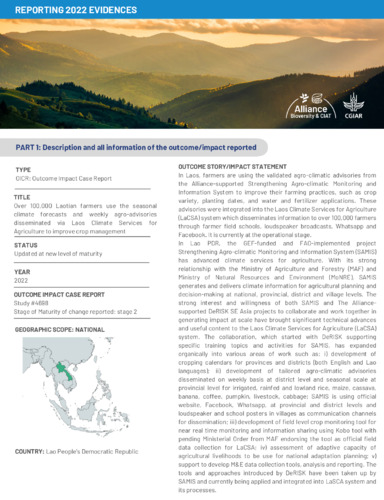Over 100,000 Laotian farmers use the seasonal climate forecasts and weekly agro-advisories disseminated via Laos climate services for agriculture to improve crop management
In Laos, farmers are using the validated agro-climatic advisories from the Alliance-supported Strengthening Agro-climatic Monitoring and Information System to improve their farming practices, such as crop variety, planting dates, and water and fertilizer applications. These advisories were integrated into the Laos Climate Services for Agriculture (LaCSA) system which disseminates information to over 100,000 farmers through farmer field schools, loudspeaker broadcasts, Whatsapp and Facebook. It is currently at the operational stage. In Lao PDR, the GEF-funded and FAO-implemented project Strengthening Agro-climatic Monitoring and Information System (SAMIS) has advanced climate services for agriculture. With its strong relationship with the Ministry of Agriculture and Forestry (MAF) and Ministry of Natural Resources and Environment (MoNRE), SAMIS
generates and delivers climate information for agricultural planning and decision-making at national, provincial, district and village levels. The strong interest and willingness of both SAMIS and The Alliance- supported DeRISK SE Asia projects to collaborate and work together in generating impact at scale have brought significant technical advances
and useful content to the Laos Climate Services for Agriculture (LaCSA) system. The collaboration, which started with DeRISK supporting specific training topics and activities for SAMIS, has expanded organically into various areas of work such as: i) development of cropping calendars for provinces and districts (both English and Lao languages); ii) development of tailored agro-climatic advisories disseminated on weekly basis at district level and seasonal scale at provincial level for irrigated, rainfed and lowland rice, maize, cassava, banana, coffee, pumpkin, livestock, cabbage; SAMIS is using official website, Facebook, Whatsapp, at provincial and district levels and loudspeaker and school posters in villages as communication channels for dissemination; iii) development of field level crop monitoring tool for near real time monitoring and information sharing using Kobo tool with pending Ministerial Order from MAF endorsing the tool as official field data collection for LaCSA; iv) assessment of adaptive capacity of agricultural livelihoods to be use for national adaptation planning; v) support to develop M&E data collection tools, analysis and reporting. The tools and approaches introduced by DeRISK have been taken up by
SAMIS and currently being applied and integrated into LaSCA system and its processes. Over 85% of target population changed practices as a result of access to agro-advisories from loudspeakers. Strategic planning related to selection of crop varieties, planting dates and water management were the main responses from farmers because of access to advisories. Most of farmers (>80%) claimed to have adjusted farming practices based on SAMIS bulletins received from community speaker, whether or not they have received additional intervention by attending FFS (Field Farmers Schools).

